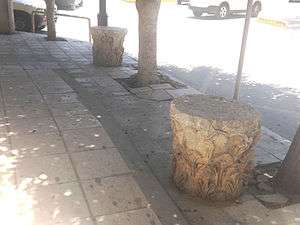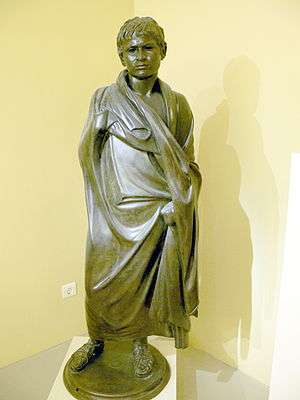Hierapytna
Hierapytna (Ancient Greek: Ἱεράπυτνα[1][2] or Ἱερὰ Πύτνα[3][4]), also Hierapydna (Ἱεράπυδνα),[5] Hierapydnes (Ἱερά Πύδνης),[6] or Hiera,[7] was a town of ancient Crete. Strabo says that it stood in the narrowest part of the island, opposite Minoa.[1] Hierapytna, according to the Stadiasmus Maris Magni, was 180 stadia from Biennus, which agrees with the distance of 20 M.P. assigned to it by the Peutinger Table. It was a town of great antiquity, and its foundation was ascribed to the Corybantes; it bore the successive names of Cyrba, Pytna, Camirus, and Hierapytna.[8][4] From an inscription preserved among the Oxford marbles, it appears that the Hierapytnians were at one time allied with the neighbouring city of Priansus.[9] There are both autonomous and Roman Imperial coins belonging to Hierapytna; the symbol on the former is generally a palm tree.[10]


References
- Strabo. Geographica. ix. p.440, x. pp. 472, 475. Page numbers refer to those of Isaac Casaubon's edition.
- Pliny. Naturalis Historia. 4.20.
- Ptolemy. The Geography. 3.17.4. , although some manuscripts have Ἱερὰ Πέτρα.
- Stephanus of Byzantium. Ethnica. s.v.
- Dio Cassius 36.8; Hierocles. Synecdemus.
- Stadiasmus Maris Magni §§ 319-320.
- Peut. Tab.
- Strabo. Geographica. x. p. 472. Page numbers refer to those of Isaac Casaubon's edition.
- Böckh, Corp. Inscrip. Graec. n. 2556; Höck, Kreta, vol. iii. p. 472.
- Eckhel, Doctrina numorum veterum, vol. ii. p. 313.
- Richard Talbert, ed. (2000). Barrington Atlas of the Greek and Roman World. Princeton University Press. p. 60, and directory notes accompanying.
- Lund University. Digital Atlas of the Roman Empire.
![]()